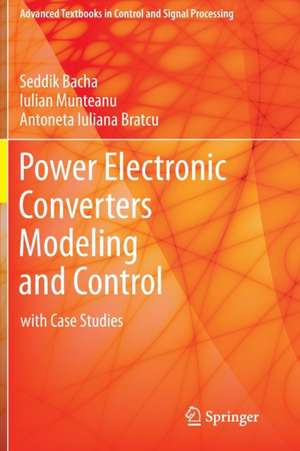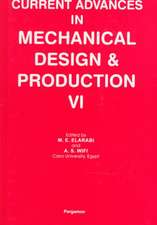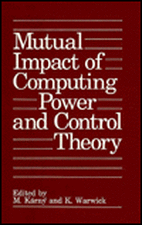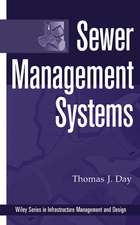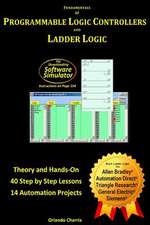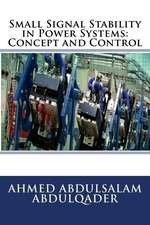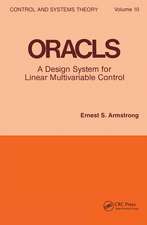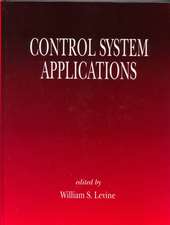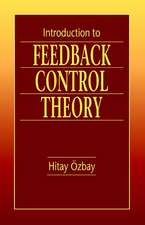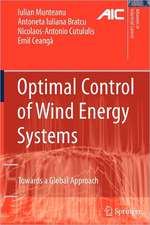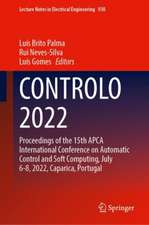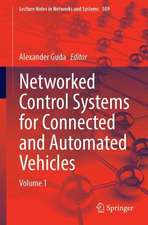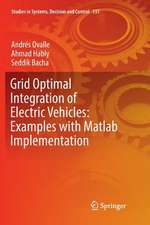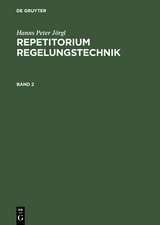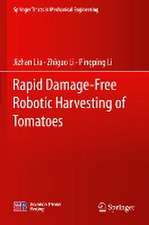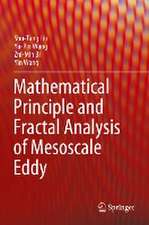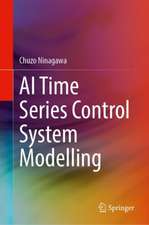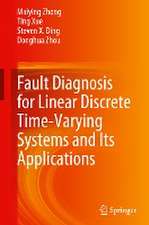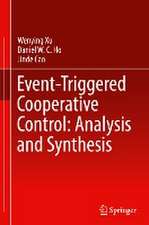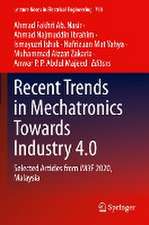Power Electronic Converters Modeling and Control: with Case Studies: Advanced Textbooks in Control and Signal Processing
Autor Seddik Bacha, Iulian Munteanu, Antoneta Iuliana Bratcuen Limba Engleză Paperback – 21 noi 2013
Power Electronics Converters Modeling and Control teaches the reader how to analyze and model the behavior of converters and so to improve their design and control. Dealing with a set of confirmed algorithms specifically developed for use with power converters, this text is in two parts: models and control methods. The first is a detailed exposition of the most usual power converter models:
· switched and averaged models;
· small/large-signal models; and
· time/frequency models.
The second focuses on three groups of control methods:
· linear control approaches normally associated with power converters;
· resonant controllers because of their significance in grid-connected applications; and
· nonlinear control methods including feedback linearization, stabilizing, passivity-based, and variable-structure control.
Extensive case-study illustration and end-of-chapter exercises reinforce the study material.
Power Electronics Converters Modeling and Control addresses the needs of graduate students interested in power electronics, providing a balanced understanding of theoretical ideas coupled with pragmatic tools based on control engineering practice in the field. Academics teaching power electronics will find this an attractive course text and the practical points make the book useful for self tuition by engineers and other practitioners wishing to bring their knowledge up to date.
Din seria Advanced Textbooks in Control and Signal Processing
- 17%
 Preț: 460.72 lei
Preț: 460.72 lei - 15%
 Preț: 659.35 lei
Preț: 659.35 lei -
 Preț: 375.68 lei
Preț: 375.68 lei - 15%
 Preț: 593.42 lei
Preț: 593.42 lei - 15%
 Preț: 616.31 lei
Preț: 616.31 lei - 18%
 Preț: 991.55 lei
Preț: 991.55 lei - 20%
 Preț: 572.72 lei
Preț: 572.72 lei - 15%
 Preț: 502.22 lei
Preț: 502.22 lei -
 Preț: 393.90 lei
Preț: 393.90 lei - 15%
 Preț: 499.26 lei
Preț: 499.26 lei -
 Preț: 394.29 lei
Preț: 394.29 lei - 15%
 Preț: 582.30 lei
Preț: 582.30 lei -
 Preț: 358.79 lei
Preț: 358.79 lei - 15%
 Preț: 652.49 lei
Preț: 652.49 lei -
 Preț: 396.02 lei
Preț: 396.02 lei -
 Preț: 396.40 lei
Preț: 396.40 lei - 15%
 Preț: 505.83 lei
Preț: 505.83 lei - 19%
 Preț: 564.48 lei
Preț: 564.48 lei - 20%
 Preț: 333.72 lei
Preț: 333.72 lei -
 Preț: 402.00 lei
Preț: 402.00 lei - 15%
 Preț: 502.22 lei
Preț: 502.22 lei - 15%
 Preț: 658.05 lei
Preț: 658.05 lei -
 Preț: 392.75 lei
Preț: 392.75 lei - 23%
 Preț: 669.20 lei
Preț: 669.20 lei - 19%
 Preț: 475.27 lei
Preț: 475.27 lei - 19%
 Preț: 531.49 lei
Preț: 531.49 lei - 19%
 Preț: 535.15 lei
Preț: 535.15 lei - 15%
 Preț: 711.40 lei
Preț: 711.40 lei - 15%
 Preț: 474.82 lei
Preț: 474.82 lei -
 Preț: 390.46 lei
Preț: 390.46 lei -
 Preț: 391.99 lei
Preț: 391.99 lei - 15%
 Preț: 532.05 lei
Preț: 532.05 lei - 15%
 Preț: 506.48 lei
Preț: 506.48 lei - 15%
 Preț: 597.01 lei
Preț: 597.01 lei - 21%
 Preț: 467.48 lei
Preț: 467.48 lei
Preț: 592.95 lei
Preț vechi: 697.58 lei
-15% Nou
Puncte Express: 889
Preț estimativ în valută:
113.46€ • 121.33$ • 94.60£
113.46€ • 121.33$ • 94.60£
Carte tipărită la comandă
Livrare economică 17 aprilie-01 mai
Preluare comenzi: 021 569.72.76
Specificații
ISBN-13: 9781447154778
ISBN-10: 1447154770
Pagini: 480
Ilustrații: XXIII, 454 p. 301 illus.
Dimensiuni: 155 x 235 x 25 mm
Greutate: 0.67 kg
Ediția:2014
Editura: SPRINGER LONDON
Colecția Springer
Seria Advanced Textbooks in Control and Signal Processing
Locul publicării:London, United Kingdom
ISBN-10: 1447154770
Pagini: 480
Ilustrații: XXIII, 454 p. 301 illus.
Dimensiuni: 155 x 235 x 25 mm
Greutate: 0.67 kg
Ediția:2014
Editura: SPRINGER LONDON
Colecția Springer
Seria Advanced Textbooks in Control and Signal Processing
Locul publicării:London, United Kingdom
Public țintă
Professional/practitionerCuprins
New Challenges in Power Electronics Systems.- Part I: Modelling of Power Electronics Systems.- Introduction to Power Electronics Modelling.- Switched Model.- Classical Average Model.- Equivalent Average Generator Model.- Generalized Average Model.- Part II: Control of Power Electronics Systems.- General Principles.- Linear Approach.- Linear Control Methods for Grid-connected Converters.- General Overview of Nonlinear Control Methods.- Linearization via Feedback Control.- Stabilization Control.- Passive Control.- Variable-structure Control and Its Associated Sliding Modes.- General Conclusion.
Notă biografică
Seddik BACHA received the title of Master of Science in Electrical Engineering from the National Polytechnic School of Algiers, Algeria (ENPA) in 1990. In 1993 he defended his Ph.D. Thesis titled “On the modelling and control of symmetric switching converters” at the Grenoble Institute of Technology (Grenoble INP) in France. He defended his HDR (“Habilitation à Diriger des Recherches”) Dissertation titled “Power Electronics Systems, Modelling and Nonlinear Control” at Grenoble INP in 1998, by proposing a generalized modelling method and a simpler approach of applying the nonlinear control to power electronics devices.
At the present Sedik BACHA is a professor at Joseph Fourier University of Grenoble, also activating within the Power Systems Group of Grenoble Electrical Engineering Laboratory (G2ELab). He has been the head of this group from 2001 up to 2012. His teaching and research interest for modelling and nonlinear control of power electronics structures dates back to 1990, marking different evolution stages and being at the present focused on power electronics control, renewable energy integration and grid energy optimisation (V2G, Smart Homes, etc.) Among the courses he teaches at the University Joseph Fourier and Grenoble INP at the present are “Power Electronics Structures” at the undergraduate level, “Power Electronics Systems Modelling” and “Power Electronics Systems Control”, both within the Master of Science in Electrical Engineering program.
Beside his involvement as a scientific manager, Professor BACHA has co-authored 3 patents, 17 book chapters, more than 200 papers on journals and international peer-reviewed conferences.
Iulian MUNTEANU received a B.Eng. degree in applied electronics from “Dunărea de Jos” University of Galaţi in Romania in 1996, a M.Sc. degree in instrumentation and control from Université du Havre inFrance in 1997 and a doctoral degree in automatic control from “Dunărea de Jos” University of Galaţi in Romania in 2006. His Ph.D. Thesis is entitled “Contributions to the optimal control of wind energy conversion systems”. From 1998 to 2011 he was with the Department of Electronics and Telecommunications from “Dunărea de Jos” University of Galaţi in Romania. From 2000 he has had a rich collaboration with Grenoble Electrical Engineering Laboratory in France, as a Ph.D. student and then as a post-doctoral researcher and he has worked on controlling power electronics systems for renewable energy conversion under the scientific supervision of Professors Daniel ROYE and Seddik BACHA. He has authored and co-authored 2 books, 1 patent, 1 book chapter, 7 research reports, more than 40 papers on journals and international peer-reviewed conferences. At the present Iulian MUNTEANU works as a post-doctoral fellow in the Control Systems Department of Grenoble Image, Speech, Signal and Automatic Control Laboratory (GIPSA-lab) in France. His research interest concerns the control of power electronics converters and of the renewable energy conversion systems.
Antoneta Iuliana BRATCU received a M.Sc. degree in electrical engineering from “Dunărea de Jos” University of Galaţi in Romania in 1996 and a doctoral degree in automatic control and computer science from Université de Franche-Comté de Besançon in France in 2001. Between 1995 and 2011 she was with “Dunărea de Jos” University of Galaţi in Romania. Between 2002 and 2005 she has had two post-doctoral stages respectively at Université de Technologie de Troyes and École Nationale Supérieure des Mines de Saint Étienne in France. Between December 2007 and December 2009 Antoneta Iuliana BRATCU was a post-doctoral fellow at the Grenoble Electrical Engineering Laboratory, working in the group led by Professor Seddik BACHA. She has authored and co-authored 3books, 1 patent, 5 research reports, more than 60 papers on journals and international peer-reviewed conferences. At the present she is an Associate Professor with Grenoble Institute of Technology and with the Control Systems Department of Grenoble Image, Speech, Signal and Automatic Control Laboratory (GIPSA-lab) in France. Her research interests include both discrete and continuous optimization applied to energy conversion systems.
At the present Sedik BACHA is a professor at Joseph Fourier University of Grenoble, also activating within the Power Systems Group of Grenoble Electrical Engineering Laboratory (G2ELab). He has been the head of this group from 2001 up to 2012. His teaching and research interest for modelling and nonlinear control of power electronics structures dates back to 1990, marking different evolution stages and being at the present focused on power electronics control, renewable energy integration and grid energy optimisation (V2G, Smart Homes, etc.) Among the courses he teaches at the University Joseph Fourier and Grenoble INP at the present are “Power Electronics Structures” at the undergraduate level, “Power Electronics Systems Modelling” and “Power Electronics Systems Control”, both within the Master of Science in Electrical Engineering program.
Beside his involvement as a scientific manager, Professor BACHA has co-authored 3 patents, 17 book chapters, more than 200 papers on journals and international peer-reviewed conferences.
Iulian MUNTEANU received a B.Eng. degree in applied electronics from “Dunărea de Jos” University of Galaţi in Romania in 1996, a M.Sc. degree in instrumentation and control from Université du Havre inFrance in 1997 and a doctoral degree in automatic control from “Dunărea de Jos” University of Galaţi in Romania in 2006. His Ph.D. Thesis is entitled “Contributions to the optimal control of wind energy conversion systems”. From 1998 to 2011 he was with the Department of Electronics and Telecommunications from “Dunărea de Jos” University of Galaţi in Romania. From 2000 he has had a rich collaboration with Grenoble Electrical Engineering Laboratory in France, as a Ph.D. student and then as a post-doctoral researcher and he has worked on controlling power electronics systems for renewable energy conversion under the scientific supervision of Professors Daniel ROYE and Seddik BACHA. He has authored and co-authored 2 books, 1 patent, 1 book chapter, 7 research reports, more than 40 papers on journals and international peer-reviewed conferences. At the present Iulian MUNTEANU works as a post-doctoral fellow in the Control Systems Department of Grenoble Image, Speech, Signal and Automatic Control Laboratory (GIPSA-lab) in France. His research interest concerns the control of power electronics converters and of the renewable energy conversion systems.
Antoneta Iuliana BRATCU received a M.Sc. degree in electrical engineering from “Dunărea de Jos” University of Galaţi in Romania in 1996 and a doctoral degree in automatic control and computer science from Université de Franche-Comté de Besançon in France in 2001. Between 1995 and 2011 she was with “Dunărea de Jos” University of Galaţi in Romania. Between 2002 and 2005 she has had two post-doctoral stages respectively at Université de Technologie de Troyes and École Nationale Supérieure des Mines de Saint Étienne in France. Between December 2007 and December 2009 Antoneta Iuliana BRATCU was a post-doctoral fellow at the Grenoble Electrical Engineering Laboratory, working in the group led by Professor Seddik BACHA. She has authored and co-authored 3books, 1 patent, 5 research reports, more than 60 papers on journals and international peer-reviewed conferences. At the present she is an Associate Professor with Grenoble Institute of Technology and with the Control Systems Department of Grenoble Image, Speech, Signal and Automatic Control Laboratory (GIPSA-lab) in France. Her research interests include both discrete and continuous optimization applied to energy conversion systems.
Textul de pe ultima copertă
Modern power electronic converters are involved in a very broad spectrum of applications: switched-mode power supplies, electrical-machine-motion-control, active power filters, distributed power generation, flexible AC transmission systems, renewable energy conversion systems and vehicular technology, among them.
Power Electronics Converters Modeling and Control teaches the reader how to analyze and model the behavior of converters and so to improve their design and control. Dealing with a set of confirmed algorithms specifically developed for use with power converters, this text is in two parts: models and control methods. The first is a detailed exposition of the most usual power converter models:
· switched and averaged models;
· small/large-signal models; and
· time/frequency models.
The second focuses on three groups of control methods:
· linear control approaches normally associated with power converters;
· resonant controllers because of their significance in grid-connected applications; and
· nonlinear control methods including feedback linearization, stabilizing, passivity-based, and variable-structure control.
Extensive case-study illustration and end-of-chapter exercises reinforce the study material.
Power Electronics Converters Modeling and Control addresses the needs of graduate students interested in power electronics, providing a balanced understanding of theoretical ideas coupled with pragmatic tools based on control engineering practice in the field. Academics teaching power electronics will find this an attractive course text and the practical points make the book useful for self tuition by engineers and other practitioners wishing to bring their knowledge up to date.
Power Electronics Converters Modeling and Control teaches the reader how to analyze and model the behavior of converters and so to improve their design and control. Dealing with a set of confirmed algorithms specifically developed for use with power converters, this text is in two parts: models and control methods. The first is a detailed exposition of the most usual power converter models:
· switched and averaged models;
· small/large-signal models; and
· time/frequency models.
The second focuses on three groups of control methods:
· linear control approaches normally associated with power converters;
· resonant controllers because of their significance in grid-connected applications; and
· nonlinear control methods including feedback linearization, stabilizing, passivity-based, and variable-structure control.
Extensive case-study illustration and end-of-chapter exercises reinforce the study material.
Power Electronics Converters Modeling and Control addresses the needs of graduate students interested in power electronics, providing a balanced understanding of theoretical ideas coupled with pragmatic tools based on control engineering practice in the field. Academics teaching power electronics will find this an attractive course text and the practical points make the book useful for self tuition by engineers and other practitioners wishing to bring their knowledge up to date.
Caracteristici
A source of specialist teaching in the control of ubiquitous power-electronic systems Classroom tested to improve the learning experience Illustrative case studies of the most common forms of power-electronic converters explain practical points of note End-of-chapter exercises buttress newly-acquired learning Includes supplementary material: sn.pub/extras
